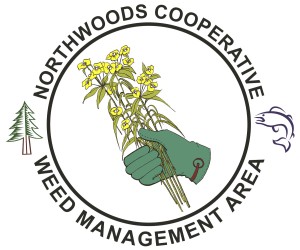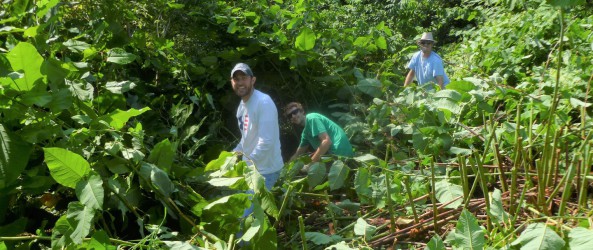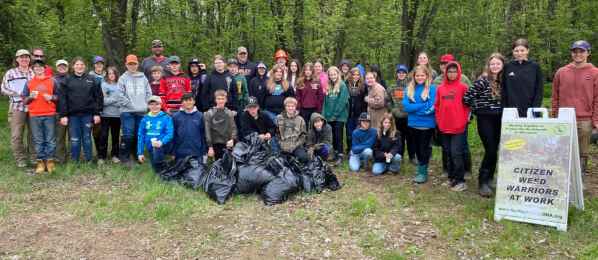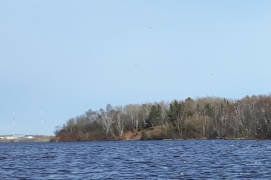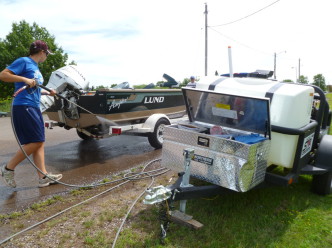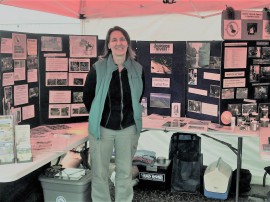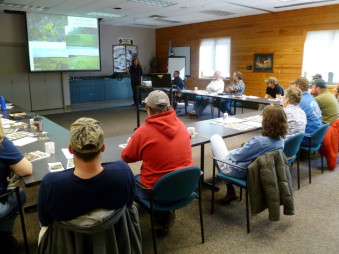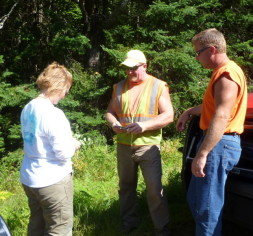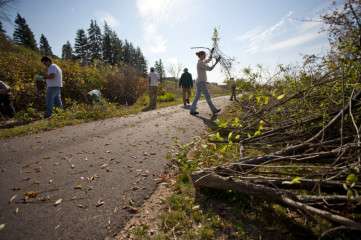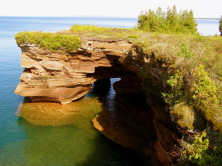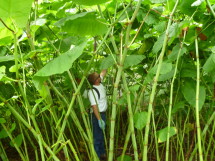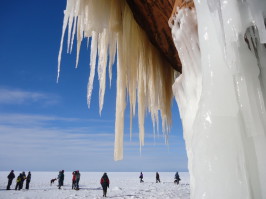NCWMA PROJECTS
The Knotweed Control Project
The NCWMA received funding through the DNR from a EPA-GLRI grant to treat knotweed species within the Lake Superior Watershed of Wisconsin from 2021 through 2025. With this funding the NCWMA has treated over 75 sites per year and documented over 15 new sites per year. Over 300 sites of knotweed have been documented in the four county region.
The NCWMA has been treating knotweed species in the region since at least 2007. In 2018, the NCWMA created a poster at the Upper Midwest Invasive Species Conference summarizing the work the NCWMA has been doing to track, treat, and control knotweeds in the NCWMA region. Learn more using the link below!
The Garlic Mustard Management and Monitoring Project
The NCWMA and parnters have worked on hand-pulling garlic mustard throughout the region since the first sites were found in the early 2000s. The NCWMA organize numerous hand-pulling events each spring. The two largest infestations of garlic mustard cover many acres along forested floodplains. Soon after these infestations were discovered, data on plant species and cover were taken annually within randomly scattered plots each spring before the hand-pulling events. Learn about the results below!
Clough Island Buckthorn Control
Boat Decontamination Project
The NCWMA hires seasonal staff to manage a portable high pressure, hot water boat wash at boat landings to decontaminate boats as they enter and exit water bodies. The NCWMA performs Clean Boats, Clean Waters (CBCW) inspection surveys to help prevent the spread of aquatic invasive species in contjunction with offering to wash boats at landings. Here is a short slideshow of the history, funding, management and success of the boat wash program.
Outreach and Education
Informational Booths and Presentations
As part of our mission, we conduct outreach programs to raise awareness about invasive species and their impacts on the environment, economy, and our health. We have done this throughout northern Wisconsin in many different venues including county fairs, farmer's markets, birding groups, sportsman groups, and other local events. If you would like us to give a presentation for your group or attend your event, please contact us.
Trainings and Workshops
The NCWMA helps organize trainings for community members, right-of-way managers, natural resource professionals, and other stakeholder groups. Some of these events have included: field days where local professionals shared their successes and failures managing invasives; a gathering of regional invasive species groups like ours from the northern part of the state; workshops for right-of-way managers; trainings by professional herbicide applicators on the latest tools and techniques.
Roadside Inventory and Management 2011-2014
Ten local town and county road crews have partnered with the NCWMA in an effort to manage invasive plants on their roadsides. The NCWMA hired two interns to inventory nearly 1,000 miles of roadsides with GPS units in 2011. They found 23 different types of invasive plants, and over 9,000 individual patches of plants. Using the data they collected, the NCWMA put together a management plan for each of the ten municipal road crews identifying priorities and management recommendations. We toured each town with the road crews to show them the invasive plants, and then demonstrated different control techniques for each species. For their part, participating towns and counties committed to 40 hours of control work to manage the invasive plants in their area. This project is funded with Title II funds from the Resource Advisory Committee of the Chequamegon National Forest. Click here to see all of the Roadside Invasive Plant Management Plans.
NCWMA RAC Project 2011-12.pdf
Adobe Acrobat document [694.9 KB]
City of Ashland Shoreline Restoration 2010-2014
In a cooperative effort with many partners, the NCWMA helped to restore two sections of the Lake Superior waterfront in the City of Ashland. The project aimed to restore plant communities to the way they might have been before the area was settled, with a diverse mix of native plants and animals. To do this, thousands of small trees, shrubs, grasses and wildflowers were planted in 2011, but in order for them to succeed, the industrial debris and invasive plants were removed first. The NCWMA removed invasives with help from community volunteers, specifically students from Northland College, College of St. Scholastica, and Ashland Middle School. This project was funded by the Great Lakes Restoration Initiative through the U.S. Environmental Protection Agency.
Find out more about current and past projects organized through the NCWMA. Many of our individual members are involved in projects through their respective agencies, and those individual projects are not listed here.

